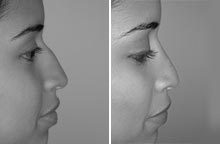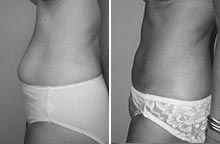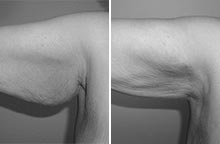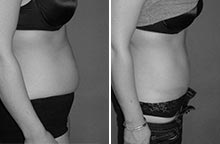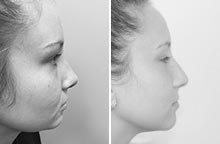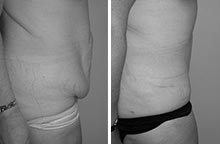Botox is a safe and simple treatment to rejuvenate your appearance without the need for complex surgery. But, like any medical treatment, you should carefully weigh the risks and benefits before scheduling your injection section.
You want people to react to you, not your Botox. And you certainly don’t want to have a bad reaction to your Botox injections. Afterall, if you’re thinking about Botox, you just want to get rid of those pesky lines and wrinkles, and restore the plump youthful face that you deserve.
Luckily, an allergic or adverse ration to a Botox treatment is extremely rare.
Botox is not a permanent treatment. But, there’s a good reason that people keep coming back to maintain the stunning results that Botox delivers. Botox is a quick, non-invasive way to get instant results. It’s the only way to see visible smoothing and wrinkle reduction in 24 to 48 hours, with results lasting up to 4 months.
Botox is approved by the FDA for safety, efficacy, and for patient satisfaction. In fact, it’s the most widely researched and studied treatment of its kind – it’s been discussed in over 528 articles of peer-reviewed scientific and medical journals, and proven effective in more than 16 years of published research. Doctors have been injecting Botox since 1989. In a study of various adverse reactions over the 12 years following its introduction, only 36 cases were reported. Studies also showed that Botox used for cosmetic procedures had a drastically lower incidence of reactions than when it was used for therapeutic purposes.(1)
Simply put, your risk of having a bad reaction to cosmetic Botox is very low. Conversely, the chance that you’ll be delighted with your results is high!
Be Ready for Botox
Botox injections are typically safe when they are prepared to FDA standards, and injected by a reputable, experienced doctor. After all, you’ll want to pick a doctor that has the eye and judgement to create natural looking results that enhance your unique beauty.
There are some ways you can prepare for your Botox treatment to make sure that you have the best possible experience, and an exceptional outcome.
- Stop taking any blood thinning medications 2 weeks prior to receiving Botox injections.
- stop consuming alcohol, as it also has a blood thinning effect.
- Drink plenty of water
- Don’t rub or massage the site of your injections.
- Tell your doctor if you are pregnant, breastfeeding, or allergic to the protein in cow’s milk.
It’s rare to experience side effects from your Botox injections, but just in case, here are some of the side effects. Keep in mind that on the off chance that you do experience side effects, they are typically mild, and don’t usually last longer than several days.
Most of these symptoms can be eliminated with over the counter medication, taking good care of yourself, and common sense! Before long you’ll be feeling better and able to enjoy the full effects of your Botox injections.
Know Your Body, Know Your Botox.
The most common and temporary side effects are reported at the actual site of the injection. This isn’t surprising. After all, Botox is an injection. Injections hurt, although most doctors will be kind enough to numb the area before they get started!

If you typically experience bruising after an injection or blood draw, you may prepare yourself for some mild bruising at the site of injection. Even the tiniest needle and the steadiest hand may damage a small blood vessel in your skin, leading to discoloration and sensitivity.
Light swelling is also commonly reported after injections. Again, keep in mind that Botox is injected into the muscle. Although nothing like a tetanus shot, your facial muscles are going to be a little confused with this new introduction, and as the Botox gets to work.
Treating yourself to Botox? Keep treating yourself afterward.
If you’re experiencing mild bruising or swelling, here’s some ways you can keep these side effects to a minimum.
- Pull out your fluffiest pillows, and keep your head elevated above your heart
- Apply ice or a cooling pack regularly for 2-3 days following your injections
- Continue to skip taking blood thinners, unless your doctor advises otherwise
- Take a break from your workouts and avoid strenuous activities for 2-3 days after
In short, rest, ice and elevate. But save some ice to put your champagne on for a day or two after your injections! Doctors recommend avoiding alcohol the day before and after your injections. By that time, you should be ready to celebrate.
A Little Too Relaxed?
Botox is a neuromodulator. These substances “hang up the phone” during communication between muscle tissue and nerve cells. They prevent muscle contractions and tension, meaning muscles don’t contract during intense emotions, or during stressful situations. That means no lines from laughing, smiling, or furrowed brows: just smooth, youthful skin.
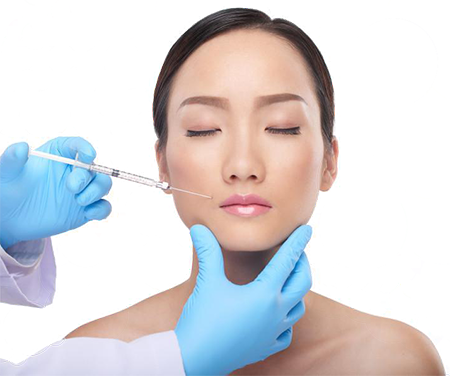
As Botox gets to work, it can occasionally migrate to areas around the site of the injection.
However, only about 5% of patients report slack or drooping muscles in their face as side effects of their Botox treatment.
Although the chances of experiencing an adverse reaction after your Botox injections are very low, it’s good to know that the kind of side effect you may experience from Botox can depend on where you’ve had your injections.
Here’s a breakdown of some of the most common sites for Botox, and your chances of having side effects based on information from Allergan, the pharmaceutical company that produces Botox.
Glabellar lines, or “the elevens” between the eyebrows and above the nose
- Drooping of the upper eyelid, or ptosis: 3%
- Facial pain: 1%
- Muscle weakness: 1%
- partial or slight paralysis of the face: 1%
Forehead lines with glabellar lines
- Headache: 9%
- Brow ptosis, or drooping of the brows: 2%
- Eyelid ptosis, or drooping of the upper eyelids: 2%
Lateral Canthal Lines, or “crows feet”
- Eyelid edema, (puffiness): 1%
How to handle your side effects from Botox.
Remember, Botox is temporary, so your side effects will be too. On occasion, Botox from injections in the upper area of the face may seep into the upper eyelid and temporarily paralyze the muscle that holds the upper eyelid up.
- Eyelid ptosis or edema is easily treated with soothing, over-the-counter eyedrops. You’ll also notice marked improvement as the effects of the Botox wear off.(2)
- Headaches and facial pain can be remedied with over the counter pain killers. Be sure to drink plenty of water.
Other Side Effects
In rarer cases, there are other side effects that patients have experienced after Botox. However, they are usually associated with injections in places other than common wrinkle locations, and doctors are generally divided in opinion as to whether they are in fact the result of Botox injections.
Dry Mouth from Botox?
Some patients report instances of Dry Mouth after Botox injections. This is obviously unpleasant, but is easily remedied and usually resolves itself after a few days.
Symptoms include a mouth that feels sticky or dry, a gravelly or hoarse throat, and unusual production of saliva.
If you’re experiencing dry mouth after your Botox injections, hydrate and lubricate!
- Take small sips of water often
- Stock up on sugar free lozenges or gum
- Use alcohol-free mouthwash, or mouthwashes that are designed to treat dry mouth
- Eliminate any congestion so that you can comfortably breathe through your nose
Trouble Swallowing, or Dysphagia
Dysphagia is another rare side effect of Botox that is rarely reported, but can also occur from Botox spreading into surrounding muscles. While having a dry mouth can certainly keep you from swallowing normally, isolated trouble swallowing can occur within 2-10 days of treatment. Luckily, this inconvenience almost always resolves itself.
If you’re having difficulty swallowing after your Botox, you can:
- Take dainty bites of food and chew it well!
- Stick to soft foods, soup or yogurts and, avoid crunchy, crusty food for a while
- Drink lots of fluids, especially while eating
- Use a straw to help drink smaller, more manageable mouthfuls.
When should I talk to my Doctor about my Botox Side Effects?
Always! Always keep in touch with your doctor to keep them apprised of anything you’re experiencing after your Botox procedure. They’ll appreciate the information, and will be able to offer further suggestions to make sure you’re healthy and comfortable. Knowing what and how you’re feeling may also help them to better regulate your future Botox treatments, and design a regiment that’s tailored to you. And most importantly, if you feel that any of these side effects are escalating or are any other than mild symptoms, contact your doctor immediately.
References
- Coté TR, Mohan AK, Polder JA, Walton MK, Braun MM. Botulinum toxin type A injections: adverse events reported to the US Food and Drug Administration in therapeutic and cosmetic cases. J Am Acad Dermatol. 2005;53(3):407-415. https://doi.org/10.1016/j.jaad.2005.06.011
- British Association of Aesthetic Plastic Surgeons. (2016). Botox: Botulinum Toxin Injections.Accessed January 20, 2021. https://patient.info/cosmetic-surgery/cosmetic-facial-injections/botox-botulinum-toxin-injections
